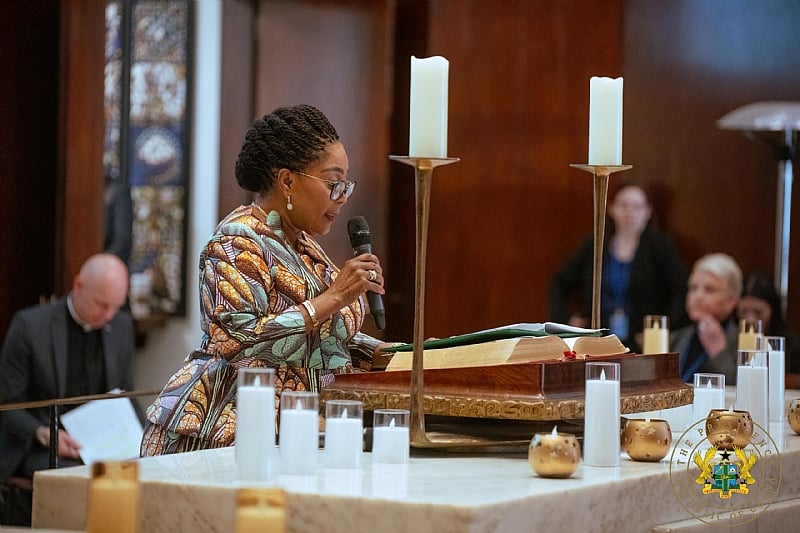The plight of children ensnared in the throes of war and humanitarian crises has reached alarming proportions, a stark reality that demands immediate and concerted global action. Mrs. Lordina Dramani Mahama, the former First Lady of Ghana, articulated this profound concern at the 7th Annual Prayer Service for Children held at the United Nations Church Centre in New York. She underscored the devastating impact of these conflicts on children, robbing them of their innocence, their futures, and their very lives. Thousands of young lives are tragically cut short, while countless others endure unimaginable suffering and trauma, leaving indelible emotional scars. Mrs. Mahama’s poignant message served as a clarion call to world leaders, emphasizing the urgent need to prioritize the safety and well-being of children caught in these dire circumstances.
The sheer scale of this humanitarian crisis is staggering. According to UN estimates cited by Mrs. Mahama, hundreds of thousands of children are currently trapped in active war zones, often forcibly recruited as child soldiers, subjected to violence, and deprived of basic necessities like food, shelter, and education. These young victims are robbed of their childhoods, forced to confront the horrors of war at an age when they should be carefree and protected. The emotional and psychological toll exacted by these experiences is immense, often leaving lasting scars that impact their ability to thrive and reach their full potential. The future of these children, and indeed the future of nations grappling with these crises, hangs precariously in the balance.
Mrs. Mahama highlighted the disproportionate burden borne by children in conflict zones, particularly in Africa, where a significant number of these crises are concentrated. She emphasized the urgent need for stronger government policies and interventions aimed at safeguarding families and communities, providing essential support networks to mitigate the devastating impact of war on children. These policies must prioritize access to education, healthcare, and psychosocial support, ensuring that children affected by conflict receive the necessary care and resources to heal and rebuild their lives. Furthermore, she stressed the importance of addressing the root causes of these conflicts, fostering peace and stability to create a safer and more nurturing environment for children to grow and flourish.
Beyond the immediate physical and emotional needs of children in conflict zones, Mrs. Mahama emphasized the long-term consequences of neglecting their well-being. Children deprived of education and opportunities are more susceptible to poverty, exploitation, and recruitment into armed groups, perpetuating a cycle of violence and instability. Investing in the future of these children is not just a moral imperative, but also a strategic necessity for building resilient and peaceful societies. By providing access to quality education, healthcare, and psychosocial support, we empower these children to become agents of change and contribute to the rebuilding of their communities.
Mrs. Mahama’s message, while delivered in the context of a prayer service, transcended the purely spiritual realm. It was a powerful call to action for world leaders, urging them to move beyond rhetoric and prioritize concrete measures to protect children in conflict zones. This requires not only increased funding for humanitarian aid and development programs, but also a concerted diplomatic effort to resolve conflicts peacefully, address the root causes of instability, and hold perpetrators of violence against children accountable. The international community must demonstrate a unwavering commitment to upholding the rights and protecting the well-being of children, ensuring that they are not forgotten victims of war.
Ultimately, the responsibility for protecting children in conflict zones lies with all of us. We must demand action from our leaders, support organizations working on the ground, and advocate for policies that prioritize the safety and welfare of children. Mrs. Mahama’s impassioned plea serves as a potent reminder that the future of these children is inextricably linked to our collective humanity. By working together, we can create a world where all children, regardless of their circumstances, have the opportunity to live in peace, security, and dignity, realizing their full potential and contributing to a brighter future for all.














